You’ll meet your local guide on arrival and, having transferred to your hotel, enjoy the remainder of your day at leisure.
Welcome to Laos! This level of personal service (such as private transfers, private tours etc) is what you can expect throughout your trip. A few services (eg boat cruises) will be shared, but we'll always make sure you're aware of these.
Once evening falls, the lights of the night market twinkle along the riverbank, drawing you in to explore. There are some excellent local food stalls on Chao Anou Road, and plenty of restaurants nearby where you can taste Vientiane’s unique fusion of flavours.



Spend the morning seeking out the best of the capital, starting with a visit to Wat Sisaket - arguably the most beautiful temple in Vientiane - which houses thousands of miniature Buddha statues. Continue to Wat Phra Keo, former location of the famed Emerald Buddha statue which now sits in the Grand Palace in Bangkok. Climb up on the roof of the Patuxai monument for fantastic panoramic views, then make a stop at the golden stupa of That Luang, the holiest place in Laos. Complete your morning at the excellent COPE exhibition centre, highlighting the country’s day-to-day struggle with unexploded ordnance left over from the Vietnam War era. As evening draws in and the city’s street markets come to life, take a tuk tuk with your guide to the night market near That Luang, which doesn’t see many tourists but is a favourite amongst the locals. Pick out a selection of dishes to sample and save room for the main event: a communal, Lao-style on-table BBQ, known as a Sin Dat.



Spend a last morning in Vientiane at leisure, perhaps making a visit to the quirky Buddha Park, an enchanting collection of Buddhist and Hindu sculptures on a riverside meadow just outside the city centre. Fly to Phonsavan and enjoy the rest of your day at leisure exploring the town’s sprinkling of cafes and restaurants catering to those intrepid travellers who make it here.



Your guide and driver will be with you all day as you explore Xieng Khouang Province. First stop is the MAG (Mine Advisory Group) Centre in Phonsavan to hear more about their crucial work clearing the country’s thousands of undetected mines and ordnance. Delve further back into the region’s past at the Xieng Khouang Provincial Museum, then travel on to the extraordinary ‘Plain of Jars’ - one of Asia’s most significant Iron Age sites and recently UNESCO-listed. Thousands of mysterious stone jars, many of which are thought to be over 2, 500 years old, are scattered across the plateau, the biggest standing almost 10 ft high. Take your time to soak up the gravitas, then continue on to visit the Mulberry Farm co-operative, and the inspirational Lone Buffalo community education project, before watching the sun set from the Phou Xang viewpoint.

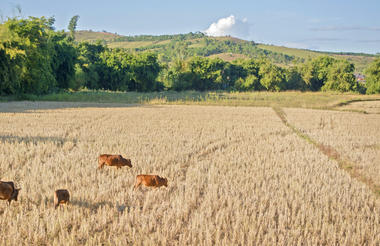
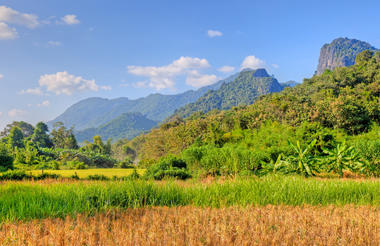
Today’s journey is long and parts of the route are windy and slow, but this allows you to really appreciate the mountainous landscape and break up the journey at small Hmong and Khmu villages and look-out points. Arrive in the village of Hintang after your morning drive, to discover the enigmatic menhirs or standing stones. No one is quite sure who built them or why, although one theory is that they mark ancient burial sites. Continue along the route, stopping at Ban Sa Levy, a Tai Phong weaving village, and arriving at Sam Neua in the early evening in time to check out some interesting markets and restaurants.



After an early start in Sam Neua (en route either visiting the weaving house to see the region’s highly regarded woven products, or walking along the river to visit the local produce market) you’ll go east to the Vieng Xai caves. These eerily atmospheric hollows are where an incredible 23, 000 Laotians sheltered during nine years of aerial bombardment in the Vietnam War era. Some of the 480 caves have now been opened to visitors to help provide investment into what is one of the poorest regions in South-East Asia. Take time to wander around some of the little-visited caves and soak up the juxtaposingly beautiful limestone karst scenery, before returning to Sam Neua to enjoy the rest of your day at leisure.



Drive to a local village where you’ll hop aboard a long tailed boat for a 1.5 hour cruise around the Nam Nern River, arriving at the Nam Et-Phou Louey National Park headquarters in time for lunch with the villagers. Settle into your jungle camp before your initial jungle exploration with a skilled local Khmu guide and tracker. After a BBQ dinner, once it’s totally dark, board the long tail boat again and float down river with the engines off, searching by spotlight for the wildlife that make this biodiverse area their home. Your guide and boat driver will communicate using hand signals to avoid disturbing the animals as you use a spotlight to search out nocturnal creatures. Head back around midnight to your traditional Lao style hut in the forest, surrounded by the sights, sounds and scents of the jungle.



Rise early to explore the Nam-Et Phou jungle with your local guide, who’ll highlight various medicinal plants that grow wild in the region, and tell you more of the area’s history. Back at headquarters, board a long-tail boat for a river journey to Ban Son Koua village, stopping at one of the area’s best birdwatching vantage points, and staying eagle-eyed for wildlife along the banks. Back on the road, passing through Vieng Thong, you’ll arrive at Nong Khiaw in the late afternoon.


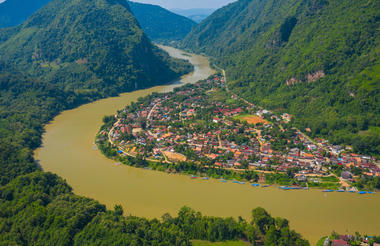
Embark at Nong Khiaw jetty to cruise up a stunning stretch of the Nam Ou River, past a sprinkling of outlying villages, including Ban Sop Khing and Ban Sob Jaem that can only be accessed by boat. Linger in both villages and enjoy lunch in the small fishing settlement of Muang Ngoi, taking time out from the urgency of modern tech to experience Laos’ rural communities, before returning by river to Nong Khiaw in the mid-afternoon. If you wish, you can make the steep hike to Nong Khiaw Mountain View Point which offers stunning views over the town and surrounding area.
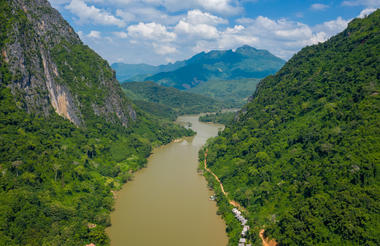
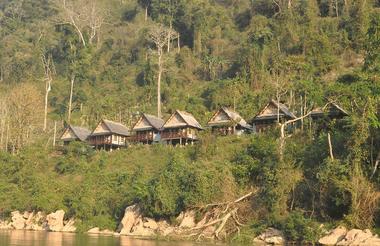
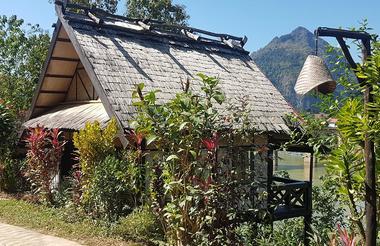
Take the scenic route towards Luang Prabang, passing through rolling hills and rice paddies, catching glimpses of the Nam Ou River as it winds across the landscape. Stop en route to visit the Pak Ou caves, home to thousands of Buddha statues - ranging from just a couple of inches tall to the size of a person - left there in times gone by. Arrive into Luang Prabang around lunchtime, after which the remainder of your day will be at leisure to start exploring the city.



Rise before dawn to witness the iconic tak bat (the giving of alms to the city’s monks), before beginning a full day’s tour of the city. Begin at the former Royal Palace, now the National Museum, for an overview of the country’s history, then take in some of the city’s temples, including the golden bas-reliefs at Wat Mai, the much-photographed Wat Xieng Thong, and the watermelon shaped stupa of Wat Visoun. Get further insight into Laos’ cultural profile at the Arts and Ethnology Centre before heading out to visit the weaving and textile villages of Ban Xangkhong and Ban Xienglek. Join the crowds climbing Mount Phousi, for spectacular sunset views across the Mekong or, if you'd prefer to avoid the steps, visit Wat Prabath Tai for a more accessible sunset experience and see the monks and novices go about their daily rituals in Wat Aham’s colourful prayer hall.



Take a day at leisure to relax or continue your exploration of Luang Prabang.



Meet your guide in Pakse, and head south towards Si Phan Don. Stop en route to explore Champasak’s colonial history, see a local potter’s workshop, and wonder at the Sisumang Buddha - a huge image of the Buddha seated on the remains of a Pre-Angkorian temple. At the temple of Vat Pa Non, follow the riverside path past ancient temples, and see how traditional rice baskets and fish traps are made, then cross by boat to the stunning Done Daeng, just too far north to be officially one of the ‘4000’, but one of the most picturesque islands in this laid-back region. The rest of the day is yours to explore the island by foot or bicycle, or just simply relax into the Si Phan Don pace of life!



Take a boat to the opposite side of the Mekong River to the evocative, pre-Angkorian ruins of Wat Phou, one of South-East Asia's most dramatically situated temple sites with superb views across the water. This UNESCO-listed site dates back to the 5th century, predating the famous Angkor Wat in Cambodia, and though much of the origin of Wat Phou is unclear, it is believed that the original temple was built by the Khmer Hindus who eventually made Angkor Wat their capital. After a rich morning of history and culture, enjoy a relaxing afternoon of r&r on the sands.
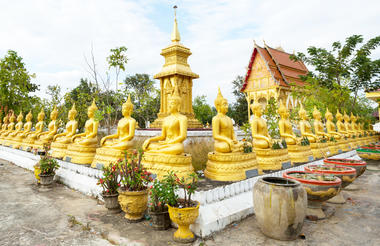
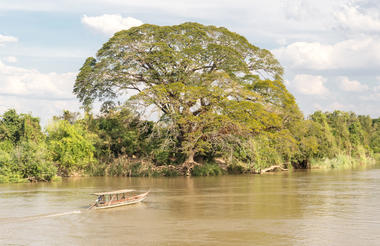
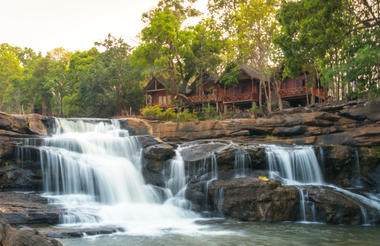
Make an early journey east across the Bolaven Plateau, passing coffee, tea and spice plantations along the way. Any visit to the plateau is a refreshing break from the heat of the day, and the area is famous for its stunning waterfalls. Stop at the most beautiful of these, Tad Fan, which, during high waters, provides a spectacular display of twin falls plummeting into the deep gorge. Next, meet a specialist local guide in the village of Ban Beng for a unique experience: exploring the Bolaven Plateau away from the well-trodden tourist route in a 1960’s-era Army jeep! Pause at Tad Moan waterfall, for a swim if you wish, then head on to a coffee farm to learn about the whole process, from bean to cup, and share a home-cooked lunch with locals, before continuing on your jeep adventure as far as Paksong. Rejoin your driver and travel by road back to Done Daeng.
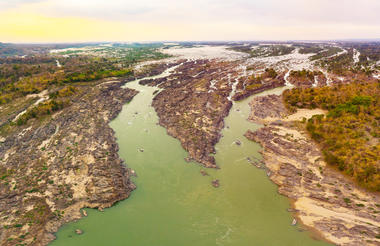
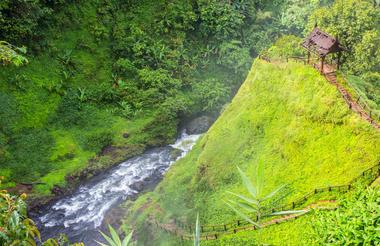
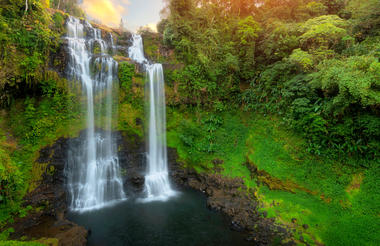
Indulge in a last morning in Si Phan Don serenity, before heading to Pakse Airport for your onward flight.






